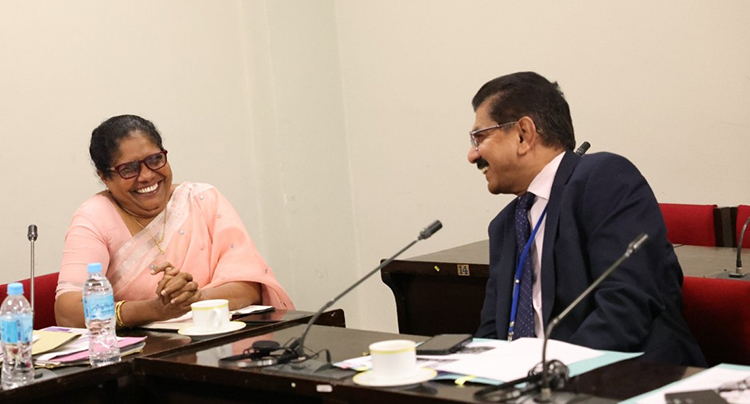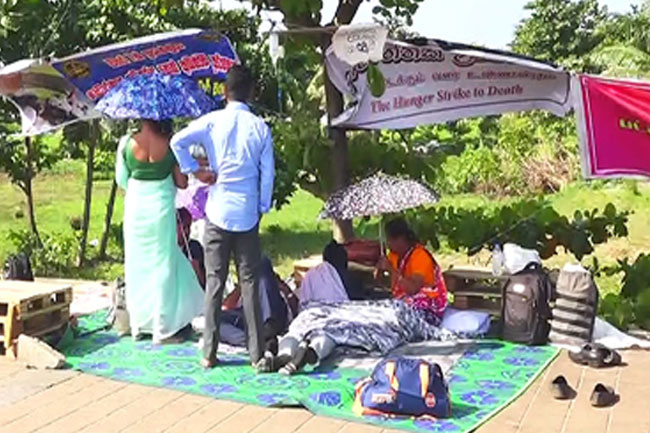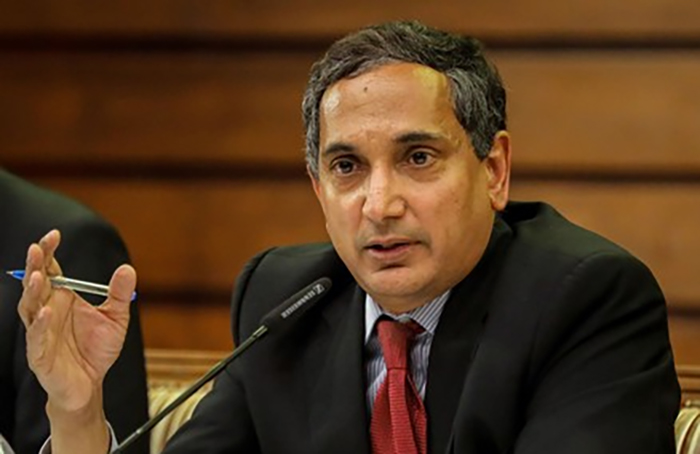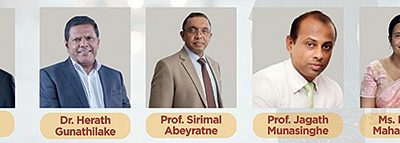News
SC in split decision clears way for Dhammika Perera as NL MP

By Chitra Weerarathne
The Supreme Court yesterday refused leave to proceed with all five fundamental rights violation petitions against the selection of Dhammika Perera to be appointed a National List Member of Parliament of the Sri Lanka Podujana Peramuna.
Notice on Sagara Kariyawasam, the General Secretary of the SLPP was also refused.
The decision was given by a divided bench.
The petitioners included the Centre for Policy Alternatives and a few others.
The bench comprised Justice Priyantha Jayawardene, Justice Yassantha Kodagoda and Justice Arjuna Obeysekera.
President’s Counsel Gamini Marapana appeared for Sagara Kariyawasam, the General Secretary of the Sri Lanka Podujana Peramuna. He said that 6.8 million people had voted for the SLPP at the General Election of 2020. But not a single one had protested against the selection of Dhammika Perera as a National List MP to fill the vacancy created by the resignation of Basil Rajapaksa. Sovereignty is in the people including the right to franchise and the power of government. General Sarath Fonseka had been appointed a UNP MP via the National List although he had contested from a different party.
Sagara Kariyawsam is a respondent in the petition filed by the Centre for Policy Alternative against the selection of Dhammika Perera to be appointed as a National List MP.
Even Basil Rajapaksa was not in the Original National List. He was picked to be appointed from that list subsequently, the Counsel Marapana pointed out.
The Counsel said the SLPP had received 59.5 percent of the total votes polled at the general election of August 2020.
The petition did not qualify for interim relief, the Counsel argued.
Sagara Kariyawasam, wanted to bring in someone experienced in economic affairs. Hence, he had selected Dhammika Perera, the Counsel added, maintaining that the petition had no merit.
President’s Counsel Romesh de Silva appeared for Dhammika Perera.
Romesh de Silva PC, said that the appointment of Dhammika Perera, cannot violate the fundamental rights of the petitioner.
According to Section 64/5 when a seat in Parliament falls vacant the Secretary of the party contacts the Commissioner of Elections to elect, a suggested suitable person, Counsel said.
Counsel said that the Supreme Court cannot interfere with Parliament. The Speaker only does the swearing in of Members of Parliament.
In our democracy, we vote for the party. After that the party picks the Members of Parliament, depending on the voting pattern, the Counsel for Dhammika Perera said. The party picks the members after considering the preferential votes, he said. Article 9 (a) dealt with 196 elected Members. Article 99/A dealt with the other 29 National List MPs, he said.
All vacancies were filled in keeping with Section 5 of the Parliamentary Elections Act. When the names in the nomination papers are exhausted and if a vacancy occurs the party secretary concerned had the discretion to recommend a suitable candidate to the Commissioner of Elections, the Counsel argued.
Deputy Solicitor General Kanishka de Silva appeared for the Attorney General.
The DSG said that Article 99/A of the Constitution provided for the filling of the vacancy after a general election.
Article 64/1/4 deals with the filling of vacancies of elected members when there is a vacancy in Parliament, the Commissioner of Elections must contact the Secretary of the Party. The respondents in the petition had acted in compliance with the law, the DSG said.
News
Tobacco and alcohol claim 22,000 lives annually

NATA to be given more powers
The Parliamentary Sectoral Oversight Committee on Health, Mass Media and Women’s Empowerment has agreed in principle to ban single-stick sales of cigarettes and increase taxes on tobacco products, according to parliamentary sources.
The decision was reached during an institutional review of the National Authority on Tobacco and Alcohol (NATA) held recently in Parliament. The meeting was chaired by MP Dr. Nihal Abeysinghe.
During the review, NATA officials informed the committee that approximately 22,000 deaths occurred annually in Sri Lanka due to tobacco and alcohol consumption. They said the country suffered an economic loss of between Rs. 225 billion and Rs. 240 billion each year due to the consumption of tobacco products and alcohol.
Officials told the committee that steps were underway to amend the National Authority on Tobacco and Alcohol Act to grant it more powers.
Noting that 104 countries had already banned the sale of loose cigarettes, the underscored the need for Sri Lanka to adopt a similar policy. When loose cigarettes were sold, mandatory health warnings on cigarette packets were not visible to consumers, the NATA officials said.
The committee was also briefed on the importance of imposing taxes on cigarettes after determining their retail prices, as part of broader measures aimed at reducing tobacco consumption.
Commenting on the matter, Dr. Abeysinghe said the committee was prepared to extend its full support for the proposed amendments to the Act, as well as for other programmes and initiatives undertaken by the National Authority on Tobacco and Alcohol.
Deputy Chair of the Committees Hemali Weerasekara, committee members MPs Dayasiri Jayasekara, Muneer Mulaffer, Samanmali Gunasinghe, Prof Sena Nanayakkara, Dr S. Sri Bhavanandarajah, Dr Ramanathan Archchuna and with the permission of the Chair, MPs Dr. Janaka Senarathna and Dr Pathmanathan Sathiyalingam were present at the committee meeting.
News
Development Officers hunger strike drags on for fourth day

The hunger strike launched by a group of Development Officers demanding their absorption into the teacher service entered its fourth day yesterday (29) outside the Presidential Secretariat Colombo.The protesters, members of the Ceylon School Development Officers’ Union (CSDOU), began their satyagraha on January 26.
One of the four officers participating in the fast-unto-death fell seriously ill on the fourth day and was rushed to hospital for treatment, while the remaining three continued the hunger strike. Earlier, Dr. Chamal Sanjeewa, President of the Doctors’ Trade Union Alliance for Medical and Civil Rights, visited the protest site to examine the health of the protesters and oversaw the administration of saline to those suffering from dehydration.
CSDOU Secretary Viraj Manaranga criticised authorities for refusing to listen to the protestors.
“Not a single official from the relevant authorities has come forward to hear our grievances, which is a matter of serious concern,” he said, accusing the government of negligence and “stepmotherly treatment” of the issue.
The Ceylon Teachers’ Union (CTU) echoed the need for legal and procedural adherence, noting that there are currently 40,000 teacher vacancies nationwide. The union stressed that a significant number of development officers and graduates remain outside the teaching service, despite provisions in the teacher service constitution allowing for their appointments, which fall under the powers of Provincial Councils.
National People’s Power (NPP) MP Chandana Sooriyarachchi said graduate development officers are required to sit a compulsory competitive examination. Former Education Minister Akila Viraj Kariyawasam, who oversaw appointments under the Good Governance administration, also stated that direct appointments are legally not feasible. He added that school development officers were absorbed into the teacher service in 2018 through competitive exams and stressed that appointments must follow established procedures, warning that strikes would not alter this process.
The hunger strike continues to draw attention to the demands of the Development Officers as they urge the government to take immediate steps to address their grievances.
News
IMF urges Lanka to diversify trade amidst global tariff risks

Sri Lanka and other small Asian economies must accelerate trade diversification or face heightened vulnerability to global tariff disputes and shifting supply chains, warned Krishna Srinivasan, Director of the Asia and Pacific Department at the International Monetary Fund (IMF).
Speaking in Colombo on the evolving global trade landscape, Srinivasan highlighted Asia’s growing exposure, particularly in the wake of tariff tensions between the United States and China. “Asia benefited a lot from trade integration, benefited a lot from openness to trade,” he said. “So much so that when tariffs were imposed by the US, Asia was subject to the highest level of tariffs.”
He cautioned that the region that gained most from open markets is now at risk of bearing the brunt of protectionist measures. For countries like Sri Lanka, he said, the message is clear: diversify or be exposed.
Srinivasan also noted that South Asia remains the least integrated sub-region in the continent. “Having greater integration with your partners within the sub-region will take you a long way,” he said. For small economies, he added, building deeper trade ties with neighbours and broadening export and production bases is essential for resilience.
Meanwhile, Sri Lanka has received a strong vote of confidence from the IMF following a high-level meeting between President Anura Kumara Dissanayake and the delegation at the Presidential Secretariat.
The visiting IMF representatives, who arrived on January 22 to assess the damage caused by Cyclone Ditwah, spent a week touring the island, engaging with affected communities and observing the impact firsthand. In a briefing, the delegation praised the government’s swift relief efforts, infrastructure restoration, and commitment to rebuilding lives, noting widespread appreciation among citizens for the administration’s handling of the crisis.
-

 Business5 days ago
Business5 days agoComBank, UnionPay launch SplendorPlus Card for travelers to China
-

 Business6 days ago
Business6 days agoComBank advances ForwardTogether agenda with event on sustainable business transformation
-

 Opinion6 days ago
Opinion6 days agoConference “Microfinance and Credit Regulatory Authority Bill: Neither Here, Nor There”
-

 Business2 days ago
Business2 days agoClimate risks, poverty, and recovery financing in focus at CEPA policy panel
-

 Opinion20 hours ago
Opinion20 hours agoSri Lanka, the Stars,and statesmen
-

 Opinion5 days ago
Opinion5 days agoLuck knocks at your door every day
-

 Business7 days ago
Business7 days agoDialog Brings the ICC Men’s T20 Cricket World Cup 2026 Closer to Sri Lankans
-

 News6 days ago
News6 days agoRising climate risks and poverty in focus at CEPA policy panel tomorrow at Open University













